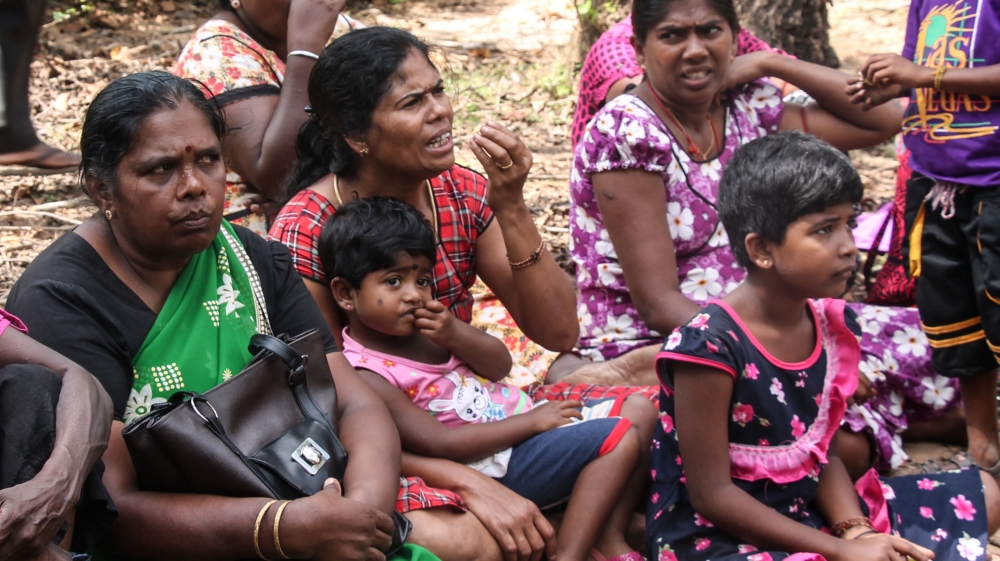
Mullativu, Sri Lanka – On Saturday, dozens of members of Sri Lanka’s Tamil minority marched towards a sprawling Keppapulavu army camp in the country’s northern Mullativu district, determined to breach its perimeter and reclaim their homes.
Keppapulavu’s residents fled their houses in 2008 during the bloody last phase of Sri Lanka’s 26-year civil war, which was fought between the government and the Liberation Tigers of Tamil Eelam (LTTE), a separatist group that sought an independent homeland for the minority Tamil population in the Buddhist majority South Asian nation.
The military occupied over 500 acres of Tamil-owned residential land in Keppapulavu, subsuming the former residents’ homes in expansive camps.
“I’m willing to die for the chance to go home,” said Shanthi (name changed on request), a 52-year-old single mother of three, tears streaming down her face.
When the war ended in 2009, Keppapulavu’s former residents were moved to Manik Farm, a military-run displacement camp plagued by widespread human rights violations, according to a 2015 United Nations report.
Manik Farm was closed in 2012, and the 560 former Keppapulavu residents remaining in the camp were resettled on small plots of undeveloped jungle in Sooripuram, a village that borders Keppapalavu.
Shanthi says that before 2008, she would earn an ample income by selling the mangos and coconuts that grew on her five acres of land, which now lie within the premises of the army camp.
But displacement left her family impoverished. “My children had to stop going to school so that they could work. It was the only way to survive,” she said.
 |
| Community members occupy the space just outside the gate [Lisa Fuller/Al Jazeera] |
The campaign to return home
Shanthi is one of fozens of Keppapulavu’s former residents who have spent years campaigning to get their homes back.
In December 2017, the army released 133 acres of land in partial success of their efforts to reclaim their own land.
However, the army’s 59th division continues to occupy about 350 acres of the land belonging to 104 families in Keppapulavu.
Those families are amongst an estimated 40,000 people – mostly Tamils – who remain displaced a decade after the end of the war. Tamils, who are mostly Hindus, form about 15 percent percent of Sri Lanka’s 22 million population.
Although the government claims that the military has released 90 percent of occupied land in the Tamil-majority north, a Human Rights Watch report last year said that this figure is impossible to verify as there is “no publicly available accurate and comprehensive mapping of land occupation”.
A study by the Adyaalam Center for Policy, a think-tank based in the northern city of Jaffna, estimated that the military continued to occupy 30,000 acres of land in Mullativu district alone based on available data.
In October last year, President Maithripala Sirisena ordered the military to release all remaining military-occupied civilian land in North and East Sri Lanka by the end of 2018.
But nearly a month after Sirisena’s deadline passed, army spokesman Brigadier Sumith Atapattu told Al Jazeera the military has no intention of relinquishing the remaining Keppapulavu land.
“We released everything we could. The balance we must retain for security purposes,” he said.
According to Rehab Mahamoor, an Amnesty International researcher, the military’s occupation of Keppapulavu is likely illegal.
“There is a legal process to acquire land for public purposes in Sri Lanka. If this process has not been followed, the military’s occupation is not legal …In Keppapulavu, this appears to be the case,” he told Al Jazeera.
‘We won’t leave this spot until they let us in’
Last week, the community declared that they would reclaim their homes in defiance of the army.
They were hoping to replicate the success of another displaced Tamil community that in April successfully retook their navy-occupied home in Iranaitheevu, a small Island off the northwest coast of Sri Lanka.
On Saturday, police prevented the protesters, who tried to push through the barricaded gate, shouting at the officers to allow them to enter.
“We are here to enforce a court order, which prohibits protesters from blocking the road,” senior police officer Halp Hettiariachchi told Al Jazeera.
Refusing to give up, the protesters have set up a tent across the street lined with coconut trees, and insist they would not leave until they reclaimed their land. They are on a 24-hour sit-in down the road from the gate.
“We won’t leave this spot until they let us in,” Shanthi said, peering through the camp fence at her land, which lies just meters from where she sits on the side of the road, still waiting to return home.












